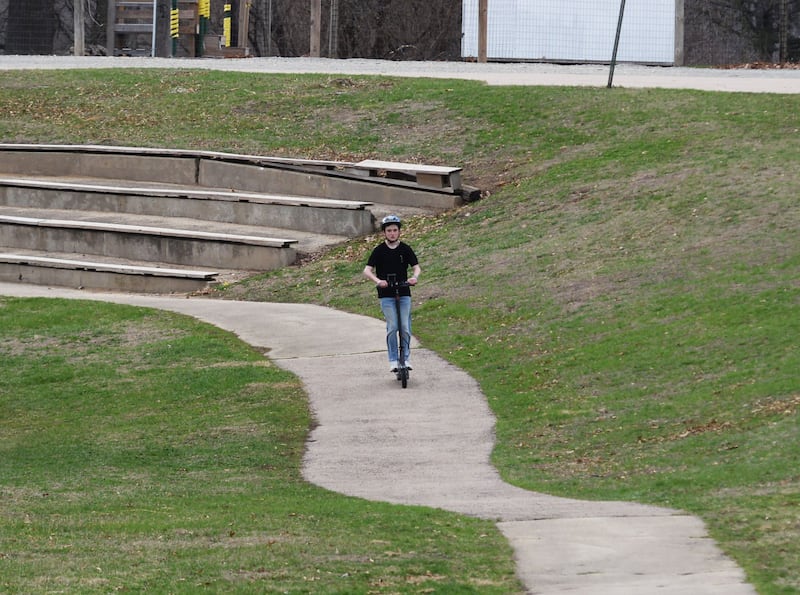Lockport officials granted preliminary approval to a plan to legalize low-speed electric scooter use by adults on city streets during a Committee of the Whole meeting Aug. 20.
The city council is expected to vote on the ordinance at its regular meeting Wednesday.
In August 2024, the state of Illinois legalized the use of low-speed electric scooters for drivers 18 and older on state roads with speed limits of 35 mph or lower.
The law made use of such devices illegal on all other roads, unless municipalities or other controlling bodies passed local laws to allow them.
:quality(70)/cloudfront-us-east-1.images.arcpublishing.com/shawmedia/UM6OBES6ZFDGTCDWULBDKJXKA4.JPG)
Lockport officials noted that use of the scooters by teenagers and children on streets has become more common in the city, despite it being illegal.
“I live near a four-way stop, and I’ve seen so many people – mostly kids but some adults, too – come within a whisker of getting hit by a car on these things because people think S-T-O-P is a suggestion,” Alderman Darren Deskin said. “It feels like it’s a matter of if, not when there’s going to be an accident.”
Police Chief John Arizzi said legalizing the scooters for adult riders at the city level would “ideally allow us to better educate the public that there is an ordinance and that they could get a fine for using these improperly.”
:quality(70)/cloudfront-us-east-1.images.arcpublishing.com/shawmedia/2W3B46KSZVGDXK4BVUCS5BKMPE.jpeg)
Arizzi noted that although the use of the scooters is already illegal, and something that officers could fine underage riders for using, the current law would require police to issue a state fine, which can range between $100 and $250 per violation.
“It’s a bit more harsh,” he said. “If we make it a city ordinance, it allows us to work more closely with the citizens and issue a lesser penalty for a citation.”
Arizzi said that, as written, a citation under the new ordinance could result in mandatory community service or a $75 fine, partially dependent on the violation and repeat offenses.
:quality(70)/cloudfront-us-east-1.images.arcpublishing.com/shawmedia/O7IHSROAZNKUX6UDNGH36OMXNM.jpg)
What’s being proposed
The proposed ordinance outlines the following regulations and specifications:
- Use of scooters by legal adults is allowed on city roads with a speed limit less than or equal to 35 mph, as well as sidewalks, trails and bike paths unless specifically noted by signage, such as on Forest Preserve District of Will County trails.
- They also can be operated on streets with higher speed limits if they are within a designated bike and scooter lane.
- No insurance or driver’s license is required to operate a low-speed electric scooter.
- Scooters are defined as vehicles that weigh no more than 100 pounds, have a top speed of 10 mph or less, and are powered by “an electric motor and human power.”
- Scooters must have two or three wheels, handlebars and a floorboard that can be stood on while riding, as well as a braking system.
- Scooters also must be equipped with a front headlamp that emits white light and a red rear reflector and/or flashing red rear lamp in order to be used at night.
- Scooters may only carry one person at a time, and riders must be able to keep at least one hand on the handlebars at all times.
- Mopeds, motorized bicycles, gas-powered scooters, ATVs, go-carts, minibikes and golf carts are all still prohibited under the ordinance.
- While the ordinance is not allowed by the state to be less restrictive on age or speed than the statewide rules, extra restriction could be added if needed at a later date.
Helmets and protective gear
Alderwoman Christina Bergbower suggested that helmets should be required by the ordinance.
Arizzi said the ordinance was written “to be as unrestrictive as possible” and noted that a helmet rule was deemed unnecessary, as bicyclists and motorcyclists are not required to wear them.
The aldermen voted unanimously to advance the ordinance to the regular City Council agenda Sept. 3.
If the ordinance passes, Arizzi said Lockport police plan to work with school resource officers in local districts to educate students about the prohibition of the scooters’ use.
Following a suggestion from elected officials, he said he also would explore options for presenting the information to parents.
“I have seen comments from parents complaining that they bought these for their kids, but the state implemented this first,” Arizzi said. “We’re just adjusting to that law and trying to keep up.”
